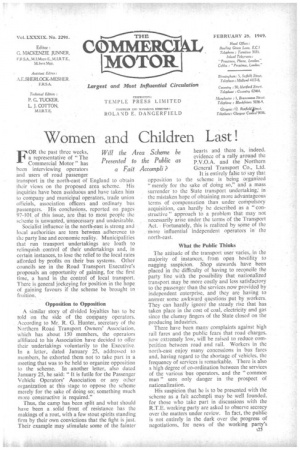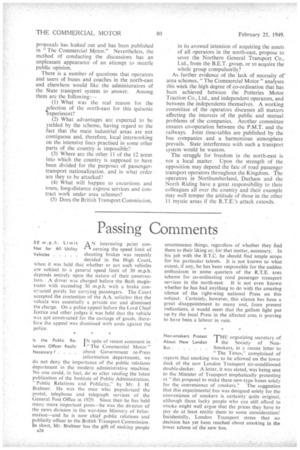Women and Children Last!
Page 1

Page 2

If you've noticed an error in this article please click here to report it so we can fix it.
FOR the past three weeks, a representative of "The Commercial Motor" has been interviewing operators and users of road passenger transport in the north-east of England to obtain their views on the proposed area scheme. His inquiries have been assiduous and have taken him to company and municipal operators, trade union officials, association officers and ordinary bus passengers. His conclusions, reported on u 97-101 of this issue, are that to most people the schetne is unwanted, unnecessary and undesirable.
Socialist influence in the north-east is strong and local authorities are torn between adherence to the party line and economic reality. Municipalities that run transport undertakings are loath to relinquish control of their undertakings and, in certain instances, to lose the relief to the local rates afforded by profits on their bus systems. Other councils see in the Road Transport Executive's proposals an opportunity of gaining, for the first time, a hand in the control of local transport. There is general jockeying for position in the hope of gaining favours if the scheme be brought to fruition.
Opposition to Opposition A similar story of divided loyalties has to be told on the side of the company operators. According to Mr. R. G. Hunter, secretary of the Northern Road Transport Owners' Association, which has about 150 members, the operators affiliated to his AssociatiOn have decided to offer their undertakings voluntarily to the Executive, In a letter, dated January 25, addressed to members, he exhorted them not to take part in a meeting that was to be held to organize opposition to the scheme. In another letter, also dated January 25, he said: "it is futile for the Passenger Vehicle Operators' Association or any other organization at this stage to oppose the scheme merely for the sake of doing so; something much more constructive is required."
Thus, the camp has been split and what should have been a solid front of resistance has the makings of a rout, with a few stout spirits standing firm by their own convictions that the fight is just. Their example may stimulate some of the fainter hearts and there is, indeed. evidence of a rally around the P.V.O.A. and the Northern General Transport Co., Ltd.
It is entirely false to say that opposition to the scheme is being organized "merely, for the sake of doing so," and a mass surrender• to the State transport undertaking,' in the mistaken hope of obtaining more advantageous terms of compensation than under compulsory acquisition, can hardly be described as a " constructive " approach to a problem that may not necessarily arise under the terms of the Transport Act. Fortunately, this is realized by some of the more influential independent operators in the north-east.
What the Public Thinks The attitude of the transport user varies, in the majority of instances, from open hostility to nagging suspicion. Shop stewards have been placed in the difficulty of having to reconcile the party line with the possibility that nationalized transport May be more costly and less satisfactory to the passenger than the services now provided by independent enterprise, and they are having to answer some awkward questions put by workers, They can hardly ignore the steady, rise that has taken place in the cost of coal, electricity and gas since the clumsy fingers of the State closed on the producing industries.
There have been many complaints against high rail fares and the public fears that road charges, now extremely low, will be raised to reduce corn'petition between road and rail. Workers in the north-east enjoy many concessions in bus fares and, having regard to the shortage of vehicles, the frequency of services is remarkable. There is also a high degree of co-ordination between the services of the various bus operators, and the "common man" sees only danger in the prospect of nationalization.
His suspicion that he is to be presented with the scheme as a fait accbmpli may be well founded. for those who take part in discussions with the R.T.E. working party are asked to observe secrecy over the matters under review. In fact, the public is not entirely in the dark over the progress of negotiations, for news of the working party's proposals has leaked' out and has been published in "The Commercial Motor." Nevertheless, the method of conducting the discussions has an unpleasant appearance of an attempt to muzzle public opinion.
There is a number of questions that operators and users of buses and coaches in the north-east and elsewhere would like the administrators of the State transport system to answer. Among them are the following:— (1) What was the real reason for the election of the north-east for this quixotic experiment?
(2) What advantages are expected to be yielded by the scheme, having regard to the fact that the main industrial areas are not contiguous and, therefore, local interworking on the intensive lines practised in some other parts of the country is impossible?
(3) Where are the other 11 of the 12 areas into which the country is supposed to have been divided for the purposes of passengertransport nationalization, and in what order are they to be attacked?
(4) What will happen to excursions and tours, long-distance express services and contract work under area schemes?
(5) Does the British Transport Commission, in its avowed intention of acquiring the assets of all operators in the north-east, propose to sever the Northern General Transport Co., Ltd., from the B.E.T. group, or to acquire the whole group compulsorily?
As further evidence of the lack of necessity or area schemes, "The Commercial Motor" analyses this week the high degree of co-ordination that has been achieved between the Potteries Motor Traction Co., Ltd., and independent operators, and between the independents themselves. A working committee of the operators discusses all matters affecting the interests of the public and mutual problems of the companies. Another committee ensures co-operation between the P.M.T. and the railways. Joint time-tables are published by the bus companies and a harmonious atmosphere prevails. State interference with such a transport system would be wanton.
The struggle for freedom in the north-east is not a local matter. Upon the strength of the opposition may depend the fate of road passenger transport operators throughout the Kingdom. The operators in Northumberland, Durham and the North Riding have a great responsibility to their colleagues all over the country and their example may well temper the attitude of those in the other 11 mystic areas if the R.T.E.'s attack extends.




























